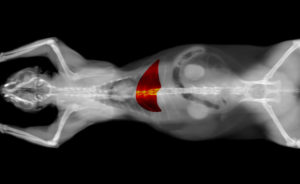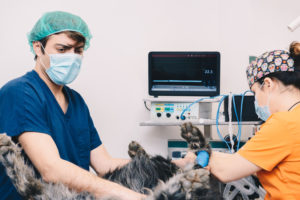Benefits of CBD for Pets
 Research has proven that CBD is a safe and effective treatment option for a variety of debilitating conditions in humans, but what about for our pets too? Can they enjoy the same pain and inflammation relieving benefits from using products that contain CBD that we can?
Research has proven that CBD is a safe and effective treatment option for a variety of debilitating conditions in humans, but what about for our pets too? Can they enjoy the same pain and inflammation relieving benefits from using products that contain CBD that we can?
While existing research is promising, much more research on CBD use in pets is needed. Since marijuana and hemp, the plants that CBD is derived from, have been illegal federally for so long (and still are to a degree), researchers have had a hard time getting approval to study CBD until just recently. Were it not for individual states legalizing and authorizing studies of marijuana, hemp, and its components, we would likely still be in the dark today about their life-changing benefits.
Even though there isn’t tons of formal research out there, anecdotal evidence is clear: CBD has significant benefits for pets similar to those shown in humans. Pet owners report improvements in:
- Pain levels, especially neuropathic pain
- Seizure activity
- Inflammation
- Sleep
- Appetite
- Nausea and vomiting
- Anxiety
This has huge implications for pets experiencing crippling diseases such as:
- Cancer
- Heart disease
- Bone tumors
- Eye disorders
- Sleep disorders
- Seizures
- Joint pain
- Diabetes/neuropathy
- Anxiety
More research and experimentation will likely show that CBD is a safe and effective treatment for dozens of conditions, improving pet quality of life well beyond what is currently possible.
If your pet is struggling with a condition that you feel would be alleviated with CBD, contact us at (813) 991-9898 or online to schedule an evaluation. Our licensed, experienced vets will review your pet’s health history and current condition before deciding if CBD is the best treatment option. We can answer all of your questions about CBD and its benefits for your pet so you are completely comfortable with the treatment plan, after which we will follow up regularly to make sure everything is going smoothly. Don’t let your pet live with pain or stress any longer. Try CBD for your pet and see just why thousands of other pet owners choose this safe and effective treatment every day!

 Up to 150,000 dogs and cats are bitten by snakes each year in the United States. Since Florida is home to almost 50 native snake species, including six venomous ones, Florida pet owners should be very careful when their pets are outside. Dogs should be kept on a lead or in a fenced area, away from high grass, woodpiles, and rocks. Cats should be kept indoors.
Up to 150,000 dogs and cats are bitten by snakes each year in the United States. Since Florida is home to almost 50 native snake species, including six venomous ones, Florida pet owners should be very careful when their pets are outside. Dogs should be kept on a lead or in a fenced area, away from high grass, woodpiles, and rocks. Cats should be kept indoors. A computerized tomography scan, or CT scan, takes multiple x-rays of a certain part of the body at many different angles to create cross-section images. Those images are combined to create 3-D models of that part of the body.
A computerized tomography scan, or CT scan, takes multiple x-rays of a certain part of the body at many different angles to create cross-section images. Those images are combined to create 3-D models of that part of the body. Heartworms. It’s a word that strikes fear in almost all dog, cat, and ferret owners, and for a good reason. Not only will heartworms leave your dear pet sick, lethargic, and isolated if they are infected, it also requires extensive special accommodations for the infected pet and treatments can be costly.
Heartworms. It’s a word that strikes fear in almost all dog, cat, and ferret owners, and for a good reason. Not only will heartworms leave your dear pet sick, lethargic, and isolated if they are infected, it also requires extensive special accommodations for the infected pet and treatments can be costly. You’re not the only one suffering from allergies this summer! Your pet may be experiencing uncomfortable seasonal allergy symptoms as well.
You’re not the only one suffering from allergies this summer! Your pet may be experiencing uncomfortable seasonal allergy symptoms as well.  Rats are some of the worst and most unwanted rodents, especially within your home. If you discover that rats are scuttling around your property, you may need to use rat poison to eliminate the infestation.
Rats are some of the worst and most unwanted rodents, especially within your home. If you discover that rats are scuttling around your property, you may need to use rat poison to eliminate the infestation.  When it comes to health and safety, our pets are just like us. Even if they’re generally healthy, dogs and cats are still vulnerable to unexpected illnesses and accidents.
When it comes to health and safety, our pets are just like us. Even if they’re generally healthy, dogs and cats are still vulnerable to unexpected illnesses and accidents.  The coronavirus pandemic has made common errands more difficult, including your pet’s regular visit to the vet. Fortunately, it is possible to enjoy a socially distanced vet visit and get your pup or cat the care she needs.
The coronavirus pandemic has made common errands more difficult, including your pet’s regular visit to the vet. Fortunately, it is possible to enjoy a socially distanced vet visit and get your pup or cat the care she needs.  Telemedicine has been a standing practice amongst general medical providers, but most people don’t think about using the service for their pets. Some health conditions can be diagnosed and treated with discussion and observation of symptoms without an exam, just as telemedicine for humans. Often, the routine visits you make to your vet can be handled over the phone or by video chat. Here are a few of the most common health issues that can be addressed during veterinary telemedicine appointments.
Telemedicine has been a standing practice amongst general medical providers, but most people don’t think about using the service for their pets. Some health conditions can be diagnosed and treated with discussion and observation of symptoms without an exam, just as telemedicine for humans. Often, the routine visits you make to your vet can be handled over the phone or by video chat. Here are a few of the most common health issues that can be addressed during veterinary telemedicine appointments.